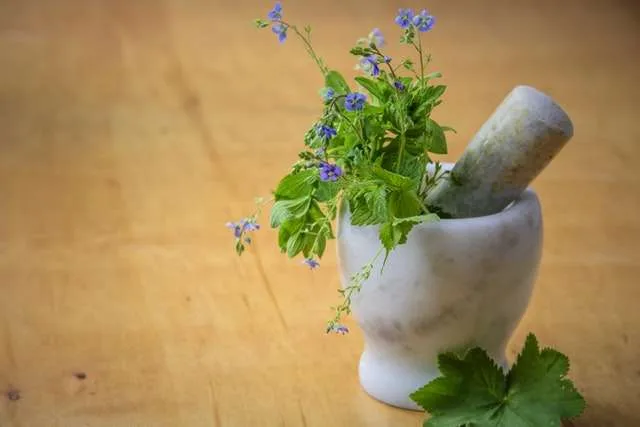Medicinal Herbs Course – 100% Online
Unlock the Healing Power of Plants
Our Medicinal Herbs Course is designed as an introduction to medicinal herbs, teaching you how to identify and prepare herbal remedies and help you develop the skills required to select plants for your own medicinal herb garden. Whether you’re a beginner or looking to deepen your knowledge, this course provides a solid foundation in growing and using herbs for health and wellness.
What You’ll Learn
-
Identifying Medicinal Herbs: Learn to distinguish between different herbs and understand their medicinal properties.
-
Herb Cultivation: Gain practical knowledge on growing and caring for medicinal herbs in various environments.
-
Preparation Methods: Discover how to prepare herbs for medicinal use, including drying, tincturing, and infusions.
-
Herbal Remedies: Explore common herbal remedies and their applications for everyday health concerns.
-
Safety and Ethics: Understand the importance of ethical harvesting and the safe use of medicinal herbs.
Why Study This Course?
Studying medicinal herbs offers numerous benefits:
-
Empowerment: Gain the knowledge to manage your health naturally and holistically.
-
Sustainability: Learn to grow your own medicinal herbs, reducing reliance on commercial pharmaceuticals.
-
Connection: Develop a deeper connection with nature and traditional healing practices.
-
Career Opportunities: Open doors to careers in herbal medicine, wellness coaching, and sustainable agriculture.
Ideal For:
-
Aspiring herbalists and alternative medicine practitioners.
-
Gardeners interested in cultivating medicinal plants.
-
Individuals seeking natural health solutions.
-
Those passionate about sustainability and self-sufficiency.
Course Details
-
Format: 100% online, self-paced learning.
-
Duration: Approximately 100 hours.
-
Support: Unlimited tutor support throughout the course.
-
Assessment: Includes self-test quizzes to reinforce learning.
Course Aims
- Distinguish between medicinal herbs in cultivation including twenty-five different genera and fifty different varieties.
- Discuss the history of medicinal herb usage.
- Compare the chemical components of different medicinal herbs in terms of their general affect on the human body.
- Prepare simple and safe herbal remedies in a domestic situation.
- Explain the potential dangers involved in dealing with plants.
- Prepare a schedule of cultural practices for a medicinal herb crop.
- Develop a production plan for a medicinal herb crop.
There are 8 lessons in this course:
Introduction to Medicinal Herbs
- Scope and Nature of Herbal Medicine
- Being Cautious
- Growing and Knowing Medicinal Herbs
- Accurate Plant Naming
- Pronouncing Plant Names
- Finding Reliable Resources
Culture of Medicinal Herbs
- What is a Herb
- Soils and Nutrition
- Cultivation
- Fertilizing Herbs
- Compost, Mulch, Watering
- Propagation
- Pest and Disease
History
- Introduction
- Hippocrates
- Chinese Herbalists
- Egyptian Influence
- Greek Influences
- The Dark Ages
- German and English Herbals
- Other Influences
Main Medicinal Herbs
- Introduction and Varieties to Grow
- Production Plan
- Improving Soil Fertility
- Cover Crops and Legumes
- Cultivation, Growing Methods, Compost
- Growing and using Ginger
- Garlic Culture
- Echinacea Culture
Herbal Remedies
- Alternatives
- Anthelmintic
- Astringents
- Bitter Tonics
- Calmatives
- Carminatives and Aromatics
- Cathartics
- Diaphoretics
- Dietetics
- Demulcents
- Emollients
- Expectorants
- Nervines
- Relaxants
- Vulnerary Herbs
- Common Herbs with Medicinal Properties
- Nervines as Healing Agents
- Natural Chemicals in Plants and their Affect on Health; saponins, phenolglycosides, anthraglycosides, flavonoids, mustard oils, polysaccharides, prussic acid, glycosides, coumarin, tannins, bitters, essential oils, alkaloids, purines, essential minerals
- Chemistry of Herbs
- Herbal Sources for Human Nutrients
Preparing Herbal remedies
- Infusion
- Decoction
- Poultice
- Medical Preparations
- Problem of Accurately Formulating Herbal Medicines
- How herbalists used to work
- The Difference Today
- Harvesting Material for Herbal Preparations
- Post Harvest Handling of Herbs
- Post Harvest Preservation; Fresh, Modified Atmosphere Packaging
- Herbal Preparations for Teas, Rinses and Baths
- Producing Essential Oils; Water distillation, Steam distillation
- Uses for Eucalyptus Oil
Poisonous Plants
- Introduction
- Review of Plant Poisons
- Hazardous Herbs
- Carcinogens, Photosensitizers, Allergens, Hormone Like Affects, Teratogens, Respiratory Inhibitors, etc
- Toxic Plant Constituents
Developing a Production Plan
- Managing a Market Garden
- Deciding What to Grow
- Production Planning
- Types of Problems
- Standards
- Crop Schedules
- Farming Medicinal Herbs
- Production Requirements for Different Herbs
Embark on your journey to mastering medicinal herbs with Careerline’s Medicinal Herbs Online Course. Start cultivating your knowledge and your garden today!
Free Bonus: Handbook of Medicinal Herbs (2nd Edition) by James Duke
This course is the first of two courses on herbal products. Our course on Manufacturing Herbal Products is also offered online.

